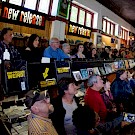 Five hundred copies of Tape Op Magazine’s first issue were printed and Xeroxed by audio engineer Larry Crane in 1996. Crane started the magazine as part of his own “adventure of learning more about recording.” Back then, he had just set up a studio in his basement, but now he owns and operates Portland’s Jackpot! Recording Studio, where he has worked with clients like Elliott Smith, Spoon, Sleater-Kinney, The Shins and more. Today, Tape Op's readership has grown to over 60,000, and the magazine (which is free—sign up now!) is a go-to resource for new and established producers and engineers worldwide.
Five hundred copies of Tape Op Magazine’s first issue were printed and Xeroxed by audio engineer Larry Crane in 1996. Crane started the magazine as part of his own “adventure of learning more about recording.” Back then, he had just set up a studio in his basement, but now he owns and operates Portland’s Jackpot! Recording Studio, where he has worked with clients like Elliott Smith, Spoon, Sleater-Kinney, The Shins and more. Today, Tape Op's readership has grown to over 60,000, and the magazine (which is free—sign up now!) is a go-to resource for new and established producers and engineers worldwide.
In the beginning, Crane tells us that he “wanted to be focusing on people working outside of the mainstream idea of a studio,” but as the magazine progressed, he realized “there was so much breadth to [recording].” To Crane, it was important to show that the process isn’t about “one superstar engineer or producer that had a hit this year.” Now, Tape Op incorporates all facets of recording—from those who make the technology to the artists working with it.
While the magazine’s content is what makes it so beloved, its business model has helped it survive through hard years in the industry. “We don’t get salaries,” Crane says. “At the end of the year, we pay our writers, and ourselves if there’s any money left.” Their success as a free magazine comes from their advertising model. “We do flat-rate advertising... we don’t spend as much time haggling with the big companies, [and] we get way more advertising from small companies.” For Crane, these small companies have made a huge difference for the magazine. “It pays to know who your clients are.”
 Larry Crane at Jackpot! Recording Studio: Photo by Jason QuigleyAnother factor in the magazine’s sustainability? “They stayed true to the roots of the technology behind recording, but embraced new things that were coming out,” Dave Gross, owner of Helldog Music, tells us. Crane is open-minded to new techniques and styles, which has helped educate readers young and old. For Crane, “the intersection between technology and art is ultimately really fascinating.”
Larry Crane at Jackpot! Recording Studio: Photo by Jason QuigleyAnother factor in the magazine’s sustainability? “They stayed true to the roots of the technology behind recording, but embraced new things that were coming out,” Dave Gross, owner of Helldog Music, tells us. Crane is open-minded to new techniques and styles, which has helped educate readers young and old. For Crane, “the intersection between technology and art is ultimately really fascinating.”
To those badmouthing new recording techniques, Crane says, “when you start telling people ‘this is the way to make records,’ you’re wrong. You’re absolutely wrong right out of the gate.” In his experience, Crane has found that “any time technology comes along, the great artists take it further, or [they] push technology to follow them.”
To Crane and all those who have worked on Tape Op comes praise from all over the industry. Along with Gross, producers Tucker Martine, who runs Flora Recording & Playback, and Tyler Stone of Portland band Sutro share their experiences with the magazine. Martine, a self-taught producer who has worked with R.E.M., The Decemberists, case/lang/veirs and others, says that if not for Tape Op, he may not have “felt enough encouragement” to keep learning. For Stone, “the thing that makes Tape Op stand out is the broad amount of information—it’s not just technical... they bring in the artistry of the craft.”
Twenty years and 112 issues later, and, according to Martine, Tape Op Magazine “still is the hub of the recording community.”
This episode features music recorded at Jackpot! Recording Studio by:
The Corin Tucker Band: “1,000 Miles”
The Thermals: “Never Listen to Me”
Witchypoo: “Olympia Must Die”




